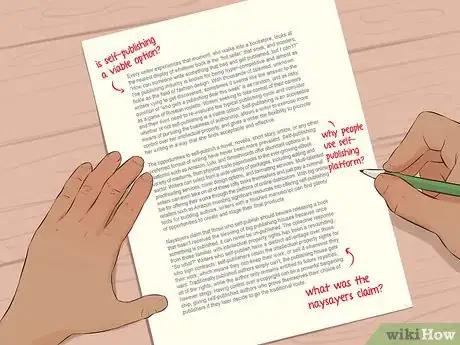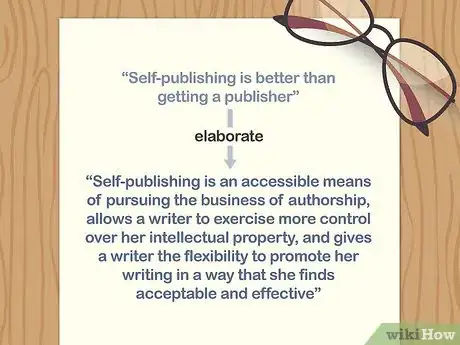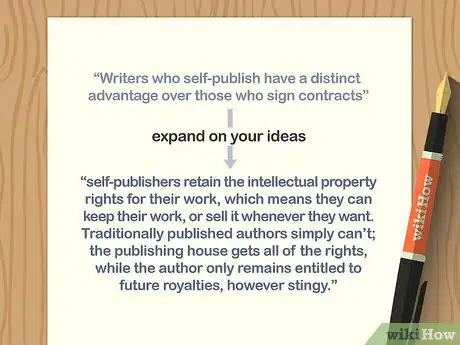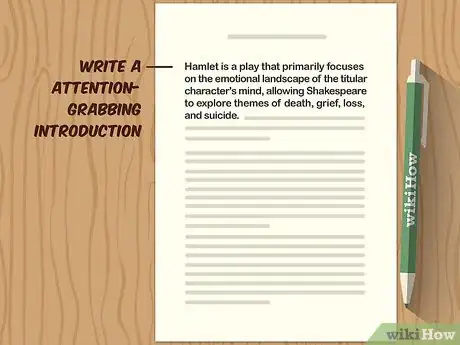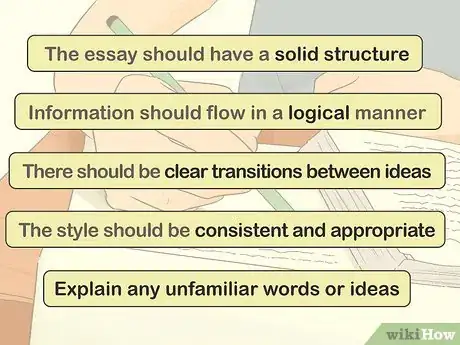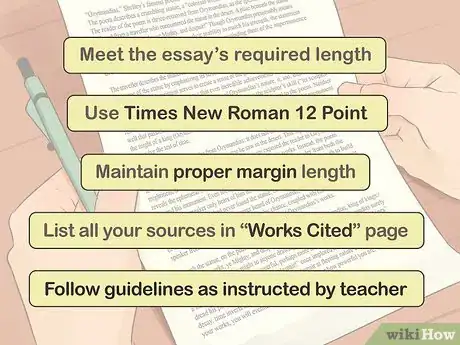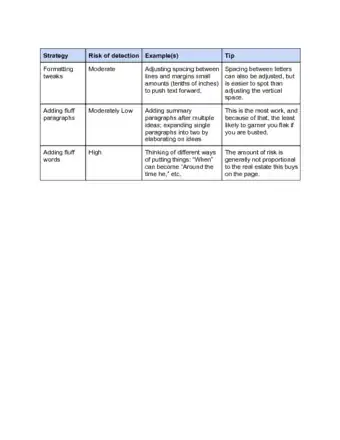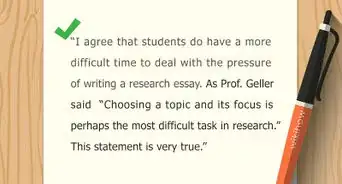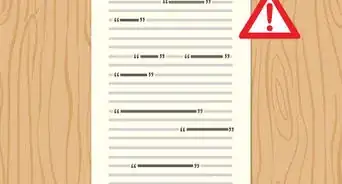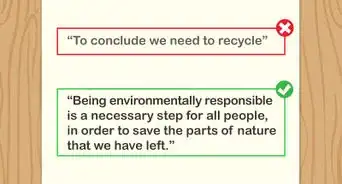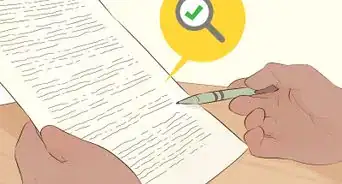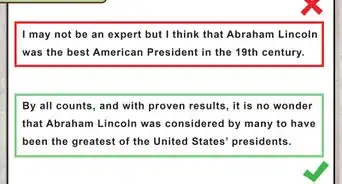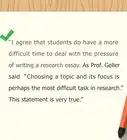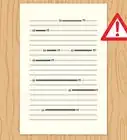This article was co-authored by Jake Adams. Jake Adams is an academic tutor and the owner of Simplifi EDU, a Santa Monica, California based online tutoring business offering learning resources and online tutors for academic subjects K-College, SAT & ACT prep, and college admissions applications. With over 14 years of professional tutoring experience, Jake is dedicated to providing his clients the very best online tutoring experience and access to a network of excellent undergraduate and graduate-level tutors from top colleges all over the nation. Jake holds a BS in International Business and Marketing from Pepperdine University.
This article has been viewed 59,498 times.
Hitting the word count for a given assignment can sometimes be tough. If your teacher or professor set a particular page count, he or she probably did so for a reason. In all likelihood, it would be difficult to do a good job going under the required page count. Therefore, if your essay is on the short side, there's probably room to expand the content. Read over your essay and be critical of your writing. Look for moments and paragraphs where additional facts, resources, and quotations may be needed. Then, go in and add this information to your essay. With a little time and dedication, you should be able to stretch your essay out to the proper page count.
Steps
Finding Places to Expand
-
1Write down questions in the margins. Print out a copy of your essay and read through it. As you go, make notes in the margins. Ask questions regarding your essay's content. Challenge some of the assertions and arguments you have made. This will help you figure out where you need to expand.
- Pause after each paragraph and ask yourself what else you could say. What facts are missing? What perspectives are you overlooking?
- For example, an essay arguing about something like global warming could always use more facts. You could write things in the margins like, "What are some specific predictions scientists have made? What specific proposals have been put in place to limit corporate pollution?"
-
2Elaborate on black and white thinking. Complexity and elaboration are important in an essay.[1] As you comb through your draft, look for examples of black and white thinking and ask yourself "How can I elaborate on this point?" At what points are you presenting a binary perspective instead of seeing the gray areas? This is especially important if you're writing an argumentative essay or a persuasive essay. It's important you thoroughly understand — and include in your essay — the other side's point of view.
- For example, say you're writing an essay about the merits of vaccinations, arguing against recent anti-vaccination campaigns. Your central argument should be more than just, "Vaccines are good." In what ways can this be demonstrated?
- You could talk about how vaccines prevent diseases, the lack of evidence of their poor health effects, and show how infectious diseases have been historically wiped out by vaccines.
- Look at what you're saying about the other side as well. Do not simply say, "Anti-vaccination campaigns are bad." Try to understand where the other side is coming from, and why people may be fearful of vaccines. Try to debunk common misconceptions, while exploring why greater public education is necessary to help people understand the benefits of vaccinations.
Advertisement -
3Look for spaces to add quotations. This is especially helpful if you're writing a literary essay. Pulling a quotation out of a work of literature can help you better prove your point. As you read through your essay, pay attention to areas that may be confusing without quotations to help ground the reader.[2]
- For example, you may be writing about the theme of suicide in Shakespeare's Hamlet. You have written something like, "It's the uncertainty of death, and not a love of life, that ultimately pushes Hamlet away from suicide."
- The above sentiment may need some context for readers to understand. You could quote a portion of Hamlet's "To Be Or Not To Be" soliloquy after this sentence, or use someone's perspective from an outside source. From there, you could analyze the words and show how they prove your point.
- Make sure not to overdo it on quotes. Do not quote the entire soliloquy, for example. Instead, choose a few lines that speak to your point. Over quoting may make it look like you're trying to stretch the essay out without actually expanding on your ideas. Quote a few sentences over an entire paragraph.
-
4Find spots to add additional context. Context may be important to an essay. Your reader may need to know a little history to understand the point you are making. As you work on your literary essay, look for places where you can add context to help the reader better understand.
- For example, say you're comparing recent congressional decisions to the New Deal politics of FDR's administration. Your argument is something like, "We need more New Deal politics in modern America." Do not assume your readers have an advanced understanding of the New Deal.
- Spend some time explaining what the New Deal was, and list its benefits. You should also explain the historical context of the New Deal. What did the US economy look like before the New Deal? What did it look like after? How does the New Deal continue to influence US politics?
- While context is important, make sure you're not adding contextual information that's not related to your thesis. You don't want your essay to be too broad and unfocused.
-
5Do some more research.[3] You may not have all the answers you need right away. As you find places where you essay needs to be expanded, you may find you need to return to basic research. If you find you need additional facts, quotes, or historical context, hit up your school's library or research online. Additional information could help substantially stretch an essay.
- Go through your notes again. You may have jotted something down in the margins in regards to what portions of the essay need more work.
Adding Additional Content
-
1Expand on your ideas. As you begin to add content, take it one paragraph at a time. Interrogate every paragraph as you go, and add the new information you gathered as needed.
- Each paragraph should support your central idea. Read each paragraph carefully and ask yourself, "What is this paragraph doing for my essay? What argument am I making here, and how is it relevant?"
- From there, see how you can make the paragraph more substantial. Could you use more facts? Do you need more historical context? Is your thinking too black and white?
- Avoid rambling, however. Stick to one idea per paragraph. If you find yourself introducing a new idea or topic, start a new paragraph. For example, returning to the New Deal essay, you've just listed the benefits of the New Deal. You begin talking about the US before and after the New Deal. This is a different subject. Begin a new paragraph.
-
2Find ways to make your sentences more dynamic. While you do not want to needlessly expand sentences, an essay can sound more eloquent with more dynamic prose. Evaluate each sentence in a paragraph. Is this sentence interesting enough? Is it clear enough? Short sentences may need expansion to better express your ideas and improve your prose overall.[4]
- For example, you see the sentence, "Hamlet is a very sad character, and this is why he contemplates suicide." This does not tell the reader all that much, and the sentence is a bit plain. You could break this up into a couple of more dynamic, specific sentences.
- Instead, you could write something like, "Hamlet is reeling from the death of his father, and feels betrayed and disgusted by his mother's quick decision to remarry his uncle. This rattles his idea of safety and comfort, and the internal dilemma that follows is what forces Hamlet to consider taking his own life."
-
3Use more background information. Return to your research as you write. You may have found some background information you did not know. See if this information fits anywhere in your essay.
- If you're writing an English essay, the author's background can help give context to the work. For example, say you're writing an essay on Virginia Woolf's "The Death of a Moth." Is there anything in Woolf's background that could help give context to the essay.
- You can add information here about Woolf's struggles with suicidal thoughts. The idea of the moth struggling for life can serve as a contrast to Woolf's occasional desires to end her life.
-
4Revise your introduction and conclusion in light of the new content. Once you've gone through and expanded, see if your introduction and conclusion need to be tweaked. You may need to add new information as the argument you're making may have shifted slightly. As the conclusion is a reiteration of your main ideas, you may have to summarize some new ideas and information in your conclusion.
- For example, in your current essay, your introduction begins, "Hamlet is a play about emotional difficulties." Find a way to make that crisper and more attention-grabbing. For example, "Hamlet is a play that primarily focuses on the emotional landscape of the titular character's mind, allowing Shakespeare to explore themes of death, grief, loss, and suicide."
- In your introduction, refer to the new evidence you have added throughout. For example, "The moment in the 'To Be or Not to Be' soliloquy, in which Hamlet ponders what dreams may come after death, speaks to the plays central theme of uncertainty, not enlightenment or love of life, preventing suicide."
Completing Your Expanded Essay
-
1Proofread carefully. After you expand your essay, careful proofreading is important. You want to make sure your essay is free of grammatical errors before turning it in for a grade.[5]
- Try to give yourself some distance from your essay. You may not recognize your own errors when you're reading the works in your head rather than what's on the page. If you have time, set the essay aside for a day and then come back to it.
- Change the look of the document, as this can also help you proofread more effectively. Changing the font, or printing out the document, may help you better catch errors.
- Find a place to work that's quiet and free of distractions.
- Ask a friend or family member to look over your essay to help you catch typos.
-
2Make sure your content is solid. In addition to basic proofreading, you should give another read through for content. If the essay has changed greatly in the expansion process, you will want to make sure your content is still solid.[6]
- Does the structure work? Does your information flow in a logical manner? Are there transitions between ideas?
- Make sure your writing style is consistent and appropriate for the assignment. If you're writing an analytical essay, your writing should be free of personal pronouns.
- Is everything in your essay clear? Do you explain any words or ideas that may be unfamiliar to your reader? Are your ideas supported by facts and evidence?
-
3Check that you followed your instructor's guidelines. Lastly, check your assignment sheet one more time. In addition to meeting page length requirements, make sure your essay meets your instructor's standards.
- Many instructors have requirements for font size and type. Make sure you're using the proper font. Your instructor may ask for specific margin lengths as well.
- If a works cited page was required, make sure you list all your sources properly and are following the right citation guidelines. Do not follow MLA guidelines if your instructor wants APA guidelines.
- If you're required to include something like a title page, make sure you do.
Essay Length Chart
Warnings
- Stretching an essay should be a means to expand on ideas in a way that improves the overall work. Using meaningless adjectives and adverbs, as well as irrelevant information, to expand your essay will not improve it. You could end up with a bad grade if you do not put in extra work to hit the required page count.⧼thumbs_response⧽
References
- ↑ Jake Adams. Academic Tutor & Test Prep Specialist. Expert Interview. 20 May 2020.
- ↑ http://canuwrite.com/essay_make_longer.php
- ↑ Jake Adams. Academic Tutor & Test Prep Specialist. Expert Interview. 20 May 2020.
- ↑ http://canuwrite.com/essay_make_longer.php
- ↑ http://writingcenter.unc.edu/handouts/editing-and-proofreading/
- ↑ http://writingcenter.unc.edu/handouts/editing-and-proofreading/
